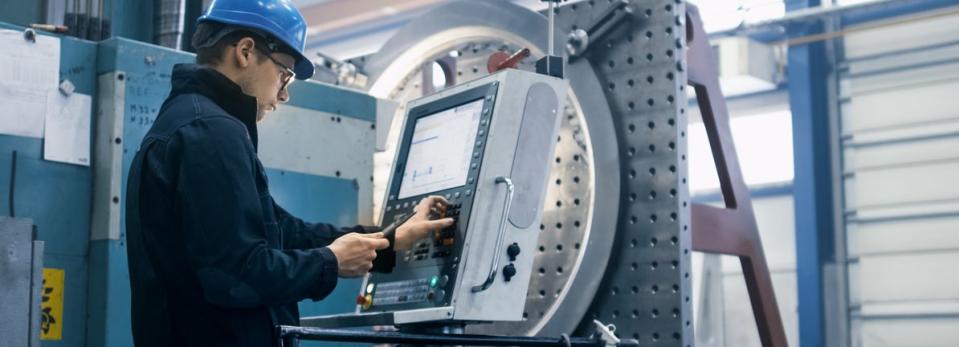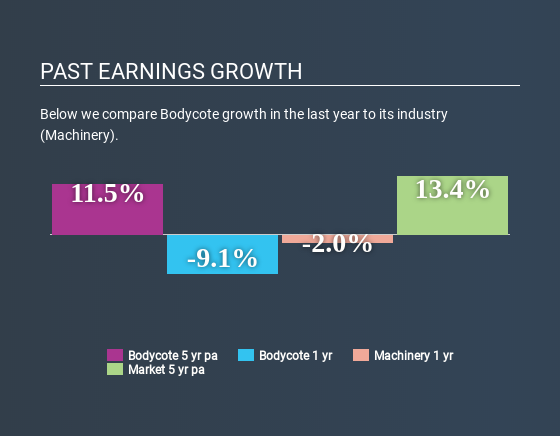Bodycote plc's (LON:BOY) Stock Has Been Sliding But Fundamentals Look Strong: Is The Market Wrong?

It is hard to get excited after looking at Bodycote's (LON:BOY) recent performance, when its stock has declined 12% over the past month. However, stock prices are usually driven by a company’s financial performance over the long term, which in this case looks quite promising. Specifically, we decided to study Bodycote's ROE in this article.
ROE or return on equity is a useful tool to assess how effectively a company can generate returns on the investment it received from its shareholders. Put another way, it reveals the company's success at turning shareholder investments into profits.
Check out our latest analysis for Bodycote
How Do You Calculate Return On Equity?
The formula for ROE is:
Return on Equity = Net Profit (from continuing operations) ÷ Shareholders' Equity
So, based on the above formula, the ROE for Bodycote is:
13% = UK£94m ÷ UK£706m (Based on the trailing twelve months to December 2019).
The 'return' is the amount earned after tax over the last twelve months. One way to conceptualize this is that for each £1 of shareholders' capital it has, the company made £0.13 in profit.
Why Is ROE Important For Earnings Growth?
Thus far, we have learnt that ROE measures how efficiently a company is generating its profits. We now need to evaluate how much profit the company reinvests or "retains" for future growth which then gives us an idea about the growth potential of the company. Assuming all else is equal, companies that have both a higher return on equity and higher profit retention are usually the ones that have a higher growth rate when compared to companies that don't have the same features.
Bodycote's Earnings Growth And 13% ROE
To begin with, Bodycote seems to have a respectable ROE. Further, the company's ROE is similar to the industry average of 13%. Consequently, this likely laid the ground for the decent growth of 11% seen over the past five years by Bodycote.
Next, on comparing Bodycote's net income growth with the industry, we found that the company's reported growth is similar to the industry average growth rate of 9.7% in the same period.
The basis for attaching value to a company is, to a great extent, tied to its earnings growth. What investors need to determine next is if the expected earnings growth, or the lack of it, is already built into the share price. By doing so, they will have an idea if the stock is headed into clear blue waters or if swampy waters await. Is BOY fairly valued? This infographic on the company's intrinsic value has everything you need to know.
Is Bodycote Using Its Retained Earnings Effectively?
With a three-year median payout ratio of 37% (implying that the company retains 63% of its profits), it seems that Bodycote is reinvesting efficiently in a way that it sees respectable amount growth in its earnings and pays a dividend that's well covered.
Besides, Bodycote has been paying dividends for at least ten years or more. This shows that the company is committed to sharing profits with its shareholders. Our latest analyst data shows that the future payout ratio of the company over the next three years is expected to be approximately 39%. Accordingly, forecasts suggest that Bodycote's future ROE will be 14% which is again, similar to the current ROE.
Summary
In total, we are pretty happy with Bodycote's performance. Specifically, we like that the company is reinvesting a huge chunk of its profits at a high rate of return. This of course has caused the company to see substantial growth in its earnings. That being so, a study of the latest analyst forecasts show that the company is expected to see a slowdown in its future earnings growth. Are these analysts expectations based on the broad expectations for the industry, or on the company's fundamentals? Click here to be taken to our analyst's forecasts page for the company.
This article by Simply Wall St is general in nature. It does not constitute a recommendation to buy or sell any stock, and does not take account of your objectives, or your financial situation. We aim to bring you long-term focused analysis driven by fundamental data. Note that our analysis may not factor in the latest price-sensitive company announcements or qualitative material. Simply Wall St has no position in any stocks mentioned.
Have feedback on this article? Concerned about the content? Get in touch with us directly. Alternatively, email editorial-team@simplywallst.com.

